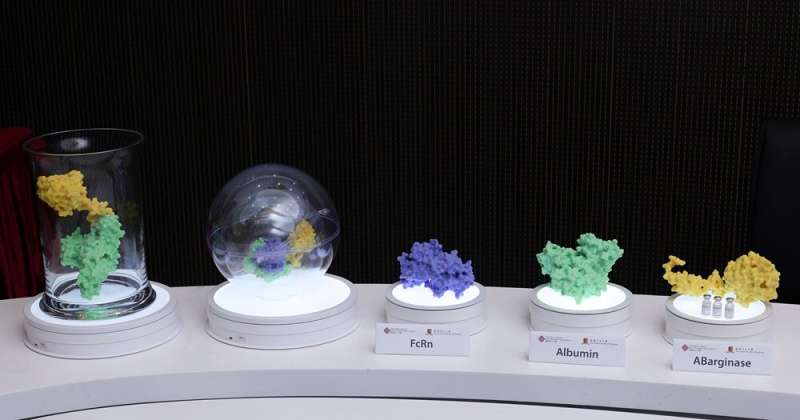This article has been reviewed according to Science X's editorial process and policies. Editors have highlighted the following attributes while ensuring the content's credibility:
fact-checked
trusted source
proofread
ABarginase, the first-in-class drug for multiple obesity-related metabolic diseases

Researchers from The Hong Kong Polytechnic University (PolyU) and The Chinese University of Hong Kong (CUHK) have jointly made a groundbreaking drug discovery in treating multiple metabolic diseases related to obesity and insulin resistance like diabetes and fatty liver disease.
The new drug, ABarginase, opens a new path for safe, long-lasting cures to multiple obesity related diseases simultaneously through an ingenious treatment mechanism—arginine starvation. Currently, patients often have to take multiple medications for these inter-related diseases, and are hence more prone to the potential risks of polypharmacy.
ABarginase shows promise for the effective treatment of multiple metabolic diseases including prediabetes, type 2 diabetes and nonalcoholic fatty liver disease. The fabrication process of ABarginase is inexpensive and highly efficient, making it affordable and widely adoptable for clinical applications.
The research was led by Prof. Thomas Leung Yun-chung, Professor of the Department of Applied Biology and Chemical Technology and Lo Ka Chung Charitable Foundation Professor in Pharmaceutical Sciences of PolyU, and Prof. Alisa Shum Sau-wun, Associate Professor, School of Biomedical Sciences of the Faculty of Medicine of CUHK.
Obesity is not just about being overweight. It is associated with many chronic diseases, such as diabetes, nonalcoholic fatty liver disease, heart disease, hypertension and cancer. The PolyU-CUHK research team discovered that a low level of arginine (a semi-essential amino acid) in the blood can suppress fat synthesis, promote fat breakdown and sensitize cells to insulin. Native arginase can break down arginine, but it has a short circulatory half-life of less than 30 minutes.
Prof. Thomas Leung said, "By using an advanced fusion protein strategy, our research team developed a long-lasting recombinant human arginase, ABarginase, that contains an albumin-binding domain, which enables it to bind with the stable and abundant albumin in the blood stream to extend its half-life by about 200-fold. ABarginase exhibits strong catabolic activity and it would only require one dose of ABarginase a week to maintain circulating arginine at low levels to achieve arginine starvation."
In preclinical studies, diet-induced obese mice were injected with ABarginase once a week, while control mice were injected with saline. Researchers found that within eight weeks of treatment with ABarginase, the treatment group's body weight, fat mass, fatty liver and characteristic features of diabetes such as high blood glucose, insulin resistance and glucose intolerance were entirely reversed.
Prof. Alisa Shum said, "The promising results show that ABarginase has great potential in safely and effectively treating multiple metabolic diseases related to obesity, insulin resistance, diabetes, and most importantly nonalcoholic fatty liver disease, which has no FDA-approved drug so far. We may have found the one drug that can cure them all."
Patent applications for this invention were filed in multiple countries. The research team is now scaling up the production for manufacturing ABarginase at Good Manufacturing Practices (GMP) grade in preparation for conducting clinical trials.
Prof. Leung and Prof. Shum further added, "As scientists, we dream of building a better world. The successful development of ABarginase is an important step towards realizing our dream."
In an affirmation of its potential benefit to patients and positive impact on global health, as well as a testament to the research excellence of inter-university collaboration, ABarginase recently won one of the two prestigious Grand Prizes awarded to Hong Kong in this year's International Exhibition of Inventions Geneva—the International Federation of Inventors' Associations (IFIA) Best Invention Award.
Obesity is generally recognized as a global health problem. According to the latest data of the World Health Organization, more than 1.9 billion adults were overweight and over 650 million adults were obese in 2016, accounting for 39% and 13% of the world's adult population. While in Hong Kong, about one in two adults are considered to be overweight or obese.




















